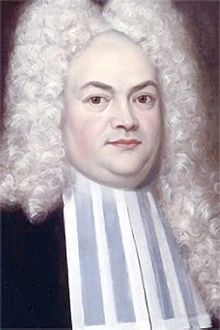Everard Otto
Everard Otto (also: Eberhard Otto, Everardus Otto ; born September 3, 1685 in Hamm ; † July 20, 1756 in Bremen ) was a German lawyer.
Life
The son of the businessman Christian Otto and his wife Maria Sophia Schmachtenberg had laid their first academic foundations at the grammar school in his hometown. At the beginning of the 18th century he came to Bremen, where he continued his education at the local grammar school and stayed for three years. He then received a position as a court master with the children of Baron von Diepenbroik and Bodelschwing. With these he moved to the grammar school in Steinfurt and to the University of Halle . For three years he had attended the lectures of Christian Thomasius , Johann Peter von Ludewig , Justus Henning Böhmer and Nikolaus Hieronymus Gundling in Halle .
He had earned such merit that the Prussian government appointed him professor of law at the University of Duisburg . He then did his doctorate with the inaugural dissertation De Diis vialibus plerorumque populorum to the doctor of law and began on October 18, 1714 with the speech De Stoica veterum Ictorum Philosophia the professorship assigned to him. During that time he received two appointments to Harderwijk University, which he turned down. Instead, on March 22, 1720, he was appointed professor of civil and public law at the University of Utrecht . He took this office on November 18, 1720 with the speech De jure imperatoris et statuum imperii circa sacra .
In Utrecht he also took part in the organizational tasks of the academy and was rector of the alma mater in 1724/25 . On March 19, 1731, he was appointed professor of feudal law in Utrecht , which position he took up on June 4, 1731 with the speech De ardua antecessoris munere . Hostility induced him to give up his teaching post in 1739 and to move to Bremen as legal counsel and office director . Here he worked for the Hanseatic city in various missions, especially at the Danish and Hanoverian courts.
Otto was a thorough connoisseur of philology, antiquity, historical science, and Roman civil and German constitutional law . He was the first to separate statistics from politics and published them in his main work, a compendium, in 1726. This was used as a textbook for legal studies at European universities for twenty years.
family
Otto was married twice. His first marriage was with Maria Elisabeth († 1718), daughter of the Duisburg law professor Wilhelm Crusen. There are two daughters from the marriage. The first daughter died young, the second daughter († October 24, 1746) married the Bremen councilor and doctor of law Heinrich Rhode in 1744. His second marriage was with Bardinen Gertrud Keller, widow of Duisburg citizen Thomas Wientgens. There were two sons from this marriage who, however, died young.
Works
- Dispulatio philologico-juridica ad LS Si Servus 27 § 28 ad legem Aquiliam. Steinfurt 1710
- De Aedilibus coloniarum et municipiorum liber singularis, in quo pleraque ad veterum politiam municipalem pertinentia explicantur. Frankfurt 1713
- De Diis vialibus plerorumque popalorum. Hall 1714
- Papinianus, sive de vita, studiis, scriptis, honoribus et morte Papiniani diatriba. Leiden 1718 Bremen 1743
- De statu Judaeorum publico. Utrecht 1721
- Dissertationes Juris publici et privati. Utrecht 1723
- De vita, studiis, scriptis et honoribus Servii Sulpicii liber singularis. Utrecht 1725, 1737
- Primae lineae notitiae rerum püblicarum. Utrecht 1726
- De jurisprudentia symbolica exercitationum trias. Utrecht 1730
- Thesaurus juris Romani continens rariora meliorum interpretum opuscula. Leiden 1725–1729, 4th vol. Utrecht 1733–1735, 5th vol., Reprint Basel 1740–1744.
- Ad Instituta Justiniani notae criticae et commentaria. Utrecht 1729
- De tutela viarum publicarum liber. Utrecht 1731, 3rd vol.
- Joh. Van Muyden, compendiosa Institutionum Justiniani Tractatio, cum additionibus Ever. Ottonis. Utrecht 1737
- Sam. Pufendorfius de officio hominis et civis cum eius annotationibus. Utrecht 1737
literature
- Abraham Jacob van der Aa : Biographical Woordenboek der Nederlanden. Verlag JJ van Brederode, Haarlem, 1867, Volume 14, p. 252 ( online , Dutch)
- Johann Samuelersch , Johann Gottfried Gruber : General Encyclopedia of Sciences and Arts . Verlag FA Brockhaus, Leipzig, 1836, 3rd section, part 7, p. 469 ( online )
- Johann Friedrich Jugler : Contributions to the legal biography. Verlag Johann Samuel Heinsius, 1773, 1st volume, 1st item, p. 151 ( online )
- Van Kuyk: OTTO (Everardus). In: Philipp Christiaan Molhuysen , Petrus Johannes Blok : Nieuw Nederlandsch Biografisch Woordenboek . (NNBW), AW Sijthoff's Uitgevers-Maatschappij, Leiden, 1912, Volume 2, Sp. 40 ( online , Dutch)
- Johann Georg Meusel : Lexicon of the German writers who died from 1750 to 1800. Gerhard Fleischer d. J., Leipzig, 1810, Volume 10, p. 246 ( online )
- Michaela Reinkenhof: Otto, Everhard. In: New German Biography (NDB). Volume 19, Duncker & Humblot, Berlin 1999, ISBN 3-428-00200-8 , pp. 704 f. ( Digitized version ).
- Albert Teichmann : Otto, Everhard . In: Allgemeine Deutsche Biographie (ADB). Volume 24, Duncker & Humblot, Leipzig 1887, p. 747.
Web link
| personal data | |
|---|---|
| SURNAME | Otto, Everard |
| ALTERNATIVE NAMES | Otto, Eberhard; Otto, Everardus |
| BRIEF DESCRIPTION | German lawyer |
| DATE OF BIRTH | September 3, 1685 |
| PLACE OF BIRTH | Hamm |
| DATE OF DEATH | July 20, 1756 |
| Place of death | Bremen |
